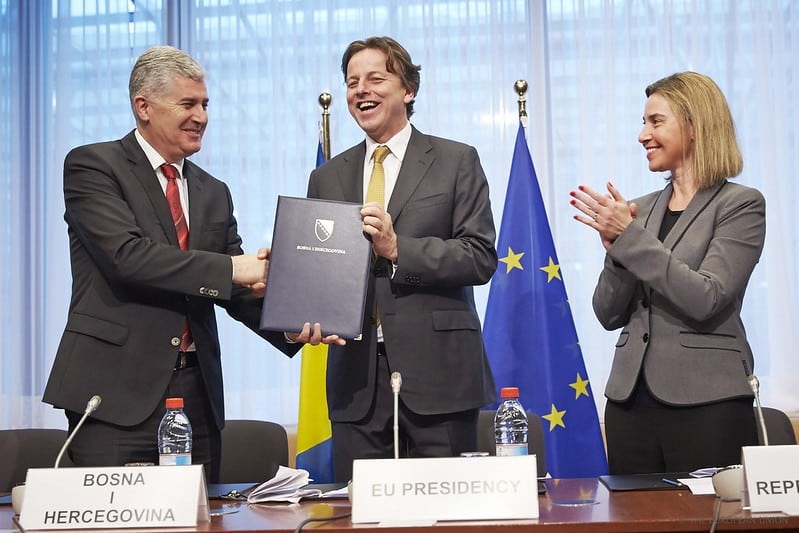Bosnia’s application to the EU, 2016 (Flickr)
On 12 October, the European Commission announced that it will recommend granting Bosnia and Herzegovina candidate status. It is a good step towards Bosnian EU accession. At the same time, it is a pleasing welcome development at a turbulent time in Bosnia and Herzegovina, when ethnic tensions are straining the fragile peace in the country.
What does the recommendation mean?
The recommendation does not mean that the Balkan country will actually be granted candidate status. In principle, it does not change the country’s current status in the European political landscape. The recommendation mainly has to do with a changed European orientation on developments and progress in Bosnia. Here the emphasis is mainly on giving a recommendation with conditions that determine when Bosnia and Herzegovina can become a candidate country, rather than on meeting conditions to get a recommendation.
The 14 key priorities identified by the European Commission in 2019 have not been adequately addressed since then. On the contrary, a further fragmentation of Bosnian society based on ethnic differences seems to be taking place in recent years. Therefore, the European Commission has now formulated in the recommendation eight points on which the Bosnian political system should take steps.
Which steps does Bosnia and Herzegovina need to take?
The recommended “Roadmap” includes changes in the legislation of Bosnia, in which prioritising integrity amendments in the current law of High Judical and Prosecutorial Council, adoption of a new law on the High Judicial and Prosecutorial Council, and an adoption of law on Prevention of Conflict of Interest are mentioned. Furthermore, Bosnia is expected to strengthen the prevention and fight corruption and organised crime decisively improve overall functioning of governmental bodies on all levels and ensure a track record in the functioning of all levels of the coordination mechanism on EU matters. Finally, the country is also expected to guarantee freedom of expression and prevent torture and ill-treatment.
In principle, by implementing these eight points, Bosnia should make rapid progress towards fulfilling the 14 key priorities to which the European Commission is adhering. The timing of the recommendation is fitting after the latest general elections, in which the Bosnian presidential triplet with took on a pro-European tone with the appointment of Bećirović and Komšić.
Positive news for the Bosnian people
For the Bosnian population, the future prospect of EU membership is positive news. Despite fragmentation, there is a general consensus that Bosnia’s European rapprochement is widely supported by the population. The NDI reported in May 2022 that as many as 85% of Bosnians said they wanted to join the EU. Even in the political nationalist-dominated Republika Srpska, the majority of the population (64%) is in favour of EU membership.
MEP Thijs Reuten underlines this by stating that the recommendation for candidate membership of Bosnia and Herzegovina is “an absolute necessity for a geopolitical EU. Member States must now make the right call and support the people of BiH on their European path.” For Bosnia, having a concrete route to EU candidate status is a new opportunity to accelerate progress towards it. The EU has an important role to support Bosnia and Herzegovina in this process.
Author: Mathieu Neelen
Sources: Euractiv, Euronews, NDI, Twitter
Photo: Flickr



